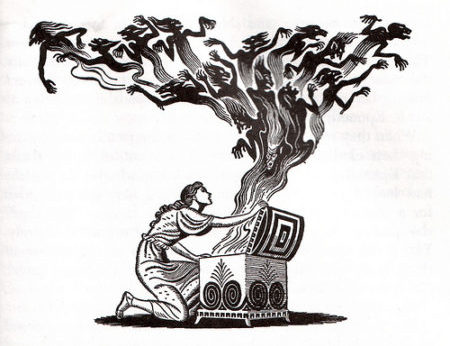Why American Nationalists Should Support the Impeachment of President Trump
The impeachment spectacle in Washington is heartbreaking for American nationalists on so many levels. As mentioned previously, Trump was always a flawed standard-bearer for nationalism, if simply because of his shameless public encouragement of the Russian and Wikileaks hacking of the Democrats. The Mueller report has since shown that his consultant Roger Stone knew at the very least when the leaks would occur. Further, Trump knew Stone was using this knowledge to coordinate campaign activities. Any hope that Trump would mend his ways and find nationalist ideals has been cruelly dashed by the results of the House impeachment investigation, which exposes his attempt to hijack American foreign policy and defy the law for his own electoral benefit.
Trump’s own betrayal, however, does not mean we should overlook the hypocrisy of his Democratic critics, who have either engaged in or condoned similar sleazy conduct. Whether it is Hunter Biden using his and his father’s name to whitewash a corrupt Ukrainian company or Bill Clinton hitting foreign leaders up for money for the Clinton Foundation while his wife was Secretary of State, it has apparently become acceptable for American politicians and their kin to trade on their connections much like Russian oligarchs and Chinese princelings. The recent Justice Department Inspector General’s report on the FBI’s misconduct in the investigation of Russian ties to the 2016 Trump campaign also showed how our own foreign intelligence community can be manipulated and abused by foreign and domestic governmental elites for personal political interests. Trump’s conduct can arguably be seen as simply the logical extension of this sickening phenomenon. It proves that, while globalization and the globalist ideology may have spread some freedom elsewhere, we have blithely ignored how it is importing here to America the same kind of elitist corruption seen in the worst authoritarian regimes. If this continues, the American Century of Shame I warned about in another post will occur faster than we think.
The key to preventing this
decline is to follow Theodore Roosevelt’s advice above and stand by our country
first, not the President, whatever the transgressions of his detractors. Indeed, true American nationalists must lead
in holding the President to a high standard of loyalty to our Constitution and
values if we are to build the consensus we need to attack the sleazy elitist
betrayals. Thus, we should sadly, but resolutely, support his impeachment and
removal from office.
The Law
We begin with the Constitution itself, which authorizes impeachment for “Treason, Bribery and other High Crimes and Misdemeanors”. The language, derived from English constitutional law, is designed to prevent impeachment for simple policy differences. At the same time, even the President’s own Attorney General Bill Barr has said that this standard is much broader than the statutory criminal law:
By including that English phrase, our Founding Fathers intended to expand the scope of impeachable offenses beyond the scope of criminally indictable offenses. This language incorporates political offenses against the state that injure the structure of government and tarnish the integrity of the political office. As Alexander Hamilton observed, these political offenses include breaches of the public trust that a president assumes once he has taken office.
Barr, William, “High Crimes and Misdemeanors”, 2 Texas Review of Law and Policy, pgs. 9-10
However, the case against the President can still start by referring to the statutory law. The federal bribery statute prohibits a public official from corruptly demanding or seeking anything of value personally in return for being influenced in the performance of any official act. As bad as bribery is, of even more concern to American nationalists should be the potential solicitation of a political contribution by a foreign government in violation of federal campaign finance law. See 52 U.S.C. Section 30121. Like the bribery statute, it prohibits the solicitation of anything of value from a foreign government by a political campaign. In this case, the “thing of value” would have been the expenditure of money by the Ukrainian government to investigate Hunter Biden and the Burisma company for the purpose of injuring the candidacy of former Vice President Biden.
The Facts
The evidence against the President
is quite direct. Rudy Guiliani began pushing
publicly and with Ukrainian prosecutors in January of 2019 for an investigation
into not only Hunter Biden, but also former Vice President Biden. In mid-July, Trump instructed acting chief of
staff Mick Mulvaney to withhold $400 million in aid to Ukraine. Immediately afterwards, the President spoke
with Ukrainian President Zelensky to ask for a “favor”. He then proceeded to talk about Biden’s son
and that “[former Vice President] Biden stopped the prosecution and a lot of
people want to find out about that …. Biden went around bragging that he stopped
the prosecution”. He urged President Zelenksy
to pursue this not only with the Attorney General, but also with Guiliani, his personal
lawyer. Indeed, he seemed to be
encouraging Zelensky to act mainly through Guiliani, not Barr.
Trump’s supporters advance two main
defenses to the clear implication of this narrative. First, they correctly state that corruption
in Ukraine has been a concern of the United States for years and that this was
simply an outgrowth of that policy.
However, the transcript does not refer to the prosecution of corruption in
the Ukrainian energy industry in general, which was the subject of past conversations
between Secretary of Energy Perry as well as his predecessors. It focused on only two specific subjects – the
issue of whether Ukraine was the source of the 2016 hacking incidents and the
activities of the Bidens, one of which was potentially a strong candidate against
Trump in the 2020 election. If the purpose was simply to pursue an element of
American foreign policy, then why was Trump’s personal lawyer Guiliani involved? It was because the President wanted Ukraine
to focus not on corruption in general, but on the Bidens and especially the former
Vice President in particular.
The other defense boils down to
the claim that “Obama did it, too”, pointing to the Inspector General’s report. The Horowitz report is definitely disturbing and
calls for more controls over foreign intelligence investigations. However, there
is no evidence that any of this was directed from the White House. It appears to have been almost a rogue operation
by elements of the FBI. The only relevance
to the accusations against Trump may be to essentially justify his dismissal of
James Comey as FBI chief, and thus refute any charge of obstruction of justice
arising out of it. It does not justify engaging
in a modern-day version of the Watergate burglary by using the American foreign
policy apparatus to dig up dirt on a political foe.
Conclusion
If American nationalism stands
for anything, it is that our leaders must be loyal to the country first and the
welfare of our citizens, not their own ambitions or the interests of other
nations. The Ukrainian incident, when
combined with his public support and inside knowledge of the Russian hacking of
2016, show that Donald Trump does not have that kind of loyalty to our country. Moreover, this is the kind of conduct that
injures the structure of our government and breaches the public trust within
the meaning of the Hamiltonian definition.
The draft impeachment resolution is correct when it says that Trump will
be a threat to national security and has acted in a manner grossly incompatible
with self-government and the rule of law. The House of Representatives should impeach the
President on the charge relating to Ukraine and the Senate should convict and remove
Trump from office. The Constitution and
the facts demand nothing less.



